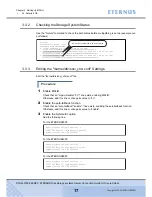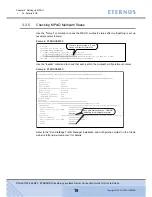
ETERNUS Disk storage systems Server Connection Guide for Oracle Solaris
8
Copyright 2010 FUJITSU LIMITED
P3AM-2722-04ENZ0
Chapter 3
Setting Up MPxIO
The MPxIO set up procedure is common to all ETERNUS2000, ETERNUS4000, and
ETERNUS8000 Disk storage systems, but some settings vary depending on the Solaris OS ver-
sion.
Set up MPxIO according to the Solaris OS version being used.
3.1
Solaris 10 OS
3.1.1
Disabling MPxIO on Some Paths
When multipathing is not required for the specific LUN, use the following procedure to add phys-
ical paths for the relevant device to the "/kernel/drv/fp.conf" file in order to disable the multipath
function for the device.
Disabling the multipath function is not necessary when multipathing is to be set up for all the
LUNs that are recognized by the OS. In these cases, proceed to
"3.1.2 Enabling MPxIO" (page
9)
.
Procedure
1
Use the "cat" command (etc.) to check the "/etc/path_to_inst" file and identify the
physical pathname of the device for which multipathing is not required.
In this example, the physical path is "/pci@8,600000/SUNW,qlc@2"
2
Add the following line to the "/kernel/drv/fp.conf" file using the "vi" command.
If this setting is omitted, multipathing is set up for all LUNs recognized by
the OS.
MPxIO must be disabled for the paths of connected devices that MPxIO
does not support (such as a tape device).
# cat /etc/path_to_inst
"/pci@8,600000/SUNW,qlc@2" 0 "qlc"
"/pci@8,600000/SUNW,qlc@2/fp@0,0" 5 "fp"
"/pci@8,600000/SUNW,qlc@2/fp@0,0/ssd@w500000e0113ce2e1,0" 5 "ssd"
Physical path
name="fp" parent="
Physical path
" port=0 mpxio-disable="yes";







































